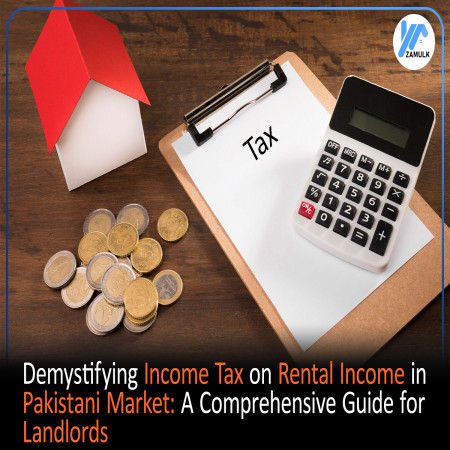Demystifying Income Tax on Rental Income in Pakistan-updated: A Comprehensive Guide for Landlords

Are you a landlord in Pakistan wondering about the complexities of income tax on rental income? Look no further! This comprehensive guide is here to demystify the topic for you.
Knowing rental income taxes is crucial for all renters, regardless of experience or tax status. This helps you follow the rules properly and make good financial plans
In this article, we talk about the key aspects of income tax on rental income, providing updated information and clear explanations. From determining taxable rental income to calculating the tax liability, we've got you covered. Learn about tax and property laws in Pakistan.
I wrote a guide on the property market and tax returns.
???? ???? ??? ??
Learn about rental income taxes in Pakistan to navigate the complexities. Stay tuned for a comprehensive guide that will make tax season a breeze for landlords like you.
Understanding the Income Tax Laws and Regulations
Pakistan's government will create an annual budget report per capita to boost the economy. Those people generally are those who file tax returns on a tax year or quarterly basis.
Pakistan's updated property tax and tax return policies for 2023-2024 have caused a decline in the real estate market. We're here to help you navigate these changes and address any questions or concerns you may have.
First and foremost you have to understand the Pakistani property tax law and regulation. What is it and how it Works?
What is Property Tax in Pakistan?
Pakistan collects yearly property tax on urban immovable property based on provincial tax laws and rental value. Tax rates are different for every province. It is either a flat rate or a percentage of the annual rental value. Property taxes vary based on rental value and land value.
" It's necessary to separate Zakat from property tax, as they are distinct entities."
Now coming forward towards the regulation, law, and tax return for the real estate market. Every province has discrete values like Punjab has a different rate as compared to Sindh and capital territory.
The FBR has listed the newly announced tax return for income on immovable rental properties, whether they are commercial or residential
- Rental income below 300,000 PKR is tax-exempt.
- Individuals earning rental income between 300,000 to 600,000 PKR must pay a 5% tax on the amount exceeding 300,000.
- Rent between 600,000 and 2,000,000 PKR requires a payment of 15,000 PKR plus 10% of the amount exceeding 600,000 PKR.
- For those with rental income beyond 2,000,000 PKR, a payment of 155,000 PKR plus 25% of the exceeding amount is necessary.
Rental Value Tax Calculation in Punjab
The rental tax value in Punjab varies from 5% to 20?sed on property valuation and location. The Excise and Taxation Department of Punjab mandates a 5% yearly rental value tax on all properties that generate rental income. Here is how you can calculate your rental income tax calculator for the properties in Punjab.
Rental Value Tax Calculation in Sindh
The taxation department states that the rental value of Sindhi properties, whether rented out or not, is subject to taxation assessment. The assessment involves applying a rate of 25% to the property's annual rental value. Here you can find the property tax calculator for the Sindh properties.
How to calculate property Tax in Pakistan?
Here's a simple method to measure the property tax, Start by determining the potential rental value or the current rental value of the property. Next, consider the property tax ratio here the basic formula to calculate the property tax is provided below
FBR uses a structured approach to calculate the property tax figure. The calculation relies on the rental value of the properties, and here are the formulas.
Property Tax = (Rental Value of Property x Tax Rate) / 100
In the above calculation criteria, the Tax Rate varies as per the type of property i.e., residential, commercial, industrial, and Agricultural. It ranges from 2% to 5%.
Common Misconceptions about Rental Income Taxation
Many people get confused about how taxes for renting homes work, understanding a property's value, chances to invest, and the money they give to the government every month to pay less in taxes when they're responsible taxpayers.
Misconception 1
Landlords pay income tax annually, not monthly. The government says 11 months of rental income is yours but last month's income for the government of Pakistan. The government of Pakistan filed the taxation on the rental properties to maintain the balance of the system. Because the Pakistani government is fully dependent on taxes.
Misconception 2
Do rental property owners have to pay income tax right after investing through a broker? However, the reality is quite different.
In most cases, investors don't transfer the rental units through property advisors or consultants. Instead, they often enter into a contract with property management companies. Many investors who own rental properties opt to engage property management companies to expertly handle tax and government compliance.
Investors do not have to pay income tax on rental units right after investing through a broker. This helps with managing taxation and government challenges.
Misconception 3
Lastly, what we have the Initial expenses are NOT tax-deductible issues or the misconception people usually have in their minds.
Initial expenses are the costs incurred when you obtain your first tenants. Examples of initial expenses are:
- Advertising fees.
- Legal fees
- Stamp duties
- Commission fees for real estate agents
- Repairs made on property before tenants move in
The government has introduced several financial incentives in Budget 2020. Buying your first home can come with a complete exemption from duty stamps for purchases up to PKR 500,000. Rent-to-own programs allow renters to purchase property at a fixed price after up to five years of renting.
An Overview of the Tax Audit Process for Rental Income
Landlords should prepare themselves for the possibility of a tax audit by the FBR. A tax audit is a thorough examination of your financial records and tax returns to ensure compliance with the tax laws. During the audit process, the FBR may request additional documentation and information related to your rental income.
Keep accurate records of rental income and expenses to avoid audit risks and ensure a hassle-free process. This includes keeping copies of rental agreements, receipts, invoices, and bank statements. By being prepared and organized, you can navigate the tax audit process with ease.
Frequently Asked Questions about Income Tax on Rental Income
1. Is rental income subject to withholding tax in Pakistan?
Yes, rental income is subject to withholding tax in Pakistan. Tenants need to deduct tax at the relevant rates and deposit it with the FBR on behalf of the landlord. The tenant should issue a withholding tax certificate to the landlord as proof of tax deduction.
2. Are there any exemptions available for rental income in Pakistan?
Yes, there are exemptions available for immovable rental income in certain cases. Low rental income or agricultural use may exempt property from taxes. specific conditions may apply to the situation.
3. What are the penalties for non-compliance with rental income tax regulations?
Non-compliance with rental income tax regulations can result in penalties and legal consequences. These penalties can include fines, interest charges, and even imprisonment in severe cases. It's crucial to comply with tax regulations and fulfill all filing requirements to avoid these penalties.
4. What is the rent tax 155?
Rent tax section 155 requires tax deduction on rent payments for immovable property, including furniture, fixtures, and related services. Providing instructions for rent tax.
Conclusion and Final Thoughts
Navigating the issues of income tax on rental income in Pakistan can be challenging for landlords. Maximize deductions and accurately calculate rental income to optimize your tax position and comply with income tax laws.
To manage rental income in Pakistan, seek advice from a tax professional or refer to the Income Tax Ordinance. Accurate rental records and knowledge of tax laws can help make better financial decisions during tax season. Equip yourself with the knowledge you need to demystify income tax on rental income in Pakistan. Happy tax planning and compliance.
Myths exist about rental income tax, property appraisal, investment options, and government tax reductions on monthly returns.
Business cards
our sponsors


